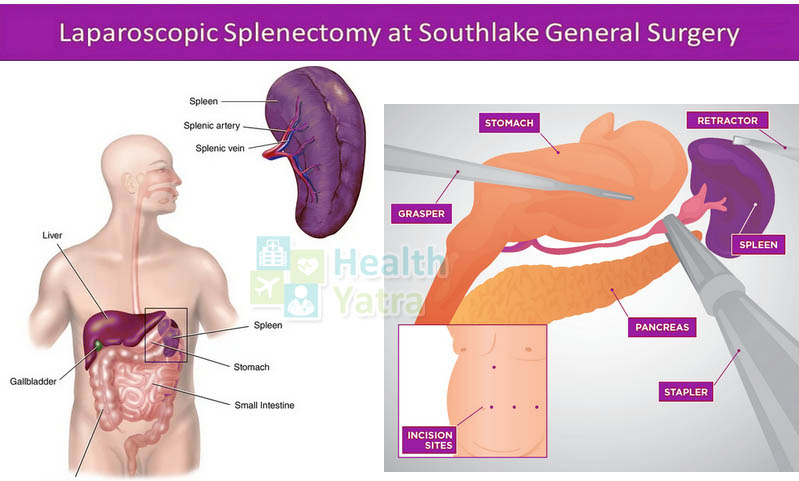Splenectomy – An Overview
A splenectomy is a form of surgical procedure useful to remove the spleen. The spleen is an organ that is located right under your rib cage on the upper left side of your abdomen. It is helpful in fighting infection and also filters unwanted material, such as old or damaged blood cells.
A splenectomy is most commonly performed today by using the laparoscopic splenectomy method that uses a tiny video camera and special surgical tools. This type of surgical technique is more advantageous than traditional surgical methods which include faster recovery and shorter hospital stay.
Need for Splenectomy
A splenectomy is useful to treat a large number of diseases and conditions. The doctor may advise a splenectomy if you have one of the following:
Ruptured spleen – If your spleen ruptures as a result of a severe abdominal injury or due to an enlarged spleen (known as splenomegaly), the result may be life-threatening including internal bleeding.
Enlarged spleen – A spleen may be removed to ease the symptoms of an enlarged spleen, which include pain and a feeling of fullness.
Blood Disorder – Blood disorders which can be treated with splenectomy include idiopathic thrombocytopenic purpura, thalassemia and sickle cell anemia. It is important to note that a splenectomy is mostly performed only after other alternate treatments have failed to reduce the symptoms of these disorders.
Cancer – Cancers which may be treated with splenectomy include chronic lymphocytic leukemia, Hodgkin’s lymphoma, non-Hodgkin’s lymphoma, hairy cell leukemia, etc.
Infection – A severe infection or a large collection of pus surrounded by inflammation (abscess) in your spleen may require spleen removal if it doesn’t respond to other treatment.
Cyst/Tumor – Non-cancerous cysts or tumors inside the spleen might require a splenectomy if they become large or are difficult to remove completely.
Risks associated with Splenectomy
A splenectomy is normally a safe procedure, but as with any major surgery, splenectomy carries the potential risk of complications, including:
- Bleeding
- Blood clots
- Infection
- Injury to nearby organs, including your stomach, pancreas and colon
There is also a long-term risk of vulnerability to infections for the life-time after the spleen is removed. The surgeon/doctor might recommend several vaccines to help fight against these infections.
Splenectomy procedure
To prepare for splenectomy and if you have time before the surgery, you may need to:
- Receive blood transfusions to ensure you have enough blood cells after your spleen is removed.
- Receive a pneumococcal vaccine and possibly other vaccines to help prevent infection after your spleen is removed.
- Temporarily stop taking certain medications and supplements.
- Avoid eating or drinking for a certain amount of time.
Right before the surgery, you will be administered a general anesthetic. After you are unconscious, your surgeon will begin the surgery using either a minimally invasive (laparoscopic) or open (traditional) procedure. The method used often depends on the size of the spleen. The larger the spleen, the more likely your surgeon will choose to do an open splenectomy.
Laparoscopic Splenectomy
During the laparoscopic splenectomy, the surgeon makes four small (keyhole) incisions in the abdomen. The next step involves inserting a tube with a tiny video camera into the abdominal cavity through one of the incisions. The surgeon watches the video images on a monitor and removes the spleen with special surgical tools that are put in the other three incisions. Then the incisions are closed using fine sutures.
Laparoscopic splenectomy is not recommended for everyone. A ruptured spleen usually requires open splenectomy. In a few cases the surgeon may begin with a laparoscopic approach and find it necessary to make a larger incision because of scar tissue from a previous operations or other complications.
Open Splenectomy
During an open splenectomy, the surgeon makes an incision in the middle of the abdomen and moves aside muscle and other tissue to reveal the spleen. The next step involves removing the spleen and closing the incision using strong sutures.
Recovery after a Splenectomy
After a splenectomy surgery the other organs in the body take over most of the functions previously performed by the spleen. You can be active without a spleen, but there is an increased risk of becoming sick or getting serious infections. This risk is highest right after the surgery. People without a spleen may also have a harder time recovering from an illness or injury.
To reduce the risk of infection, the doctor may recommend vaccines against pneumonia, influenza, Haemophilus influenza type b (Hib) and meningococci. In some cases, the doctor may also recommend preventive antibiotics, especially for children under 5 and those with other conditions that increase their risk of serious infections.
Choose HealthYatra for Advanced and Affordable Splenectomy in India
HealthYatra is the largest medical tourism service provider in India with a reach to high-class healthcare facilities in all major cities of India. It is connected with the most modern and efficient multi-specialty hospitals and clinics that are equipped with the best and most modern equipments only. HealthYatra offers every patient with the most advanced and affordable splenectomy surgery in India at the hands of the most-experienced surgeons and medical professionals.
KEYWORDS : splenectomy surgery cost in india, spleen surgery cost in bangalore, spleen doctor specialist near me, spleen specialist doctor in india, spleen removal surgery cost in hyderabad, spleen specialist doctor in delhi, spleen removal side effects, spleen specialist doctor in chennai, splenectomy: indications, splenectomy vaccination, splenectomy complications, splenectomy causes, life expectancy after splenectomy, splenectomy procedure, splenectomy complications long-term, splenectomy scar
For More Information Call on : +91 7387617343 Email : [email protected] Direct Contact on Whatsapp : +91 7387617343
[contact-form-7 id=”536″ title=”Contact form 1″]

